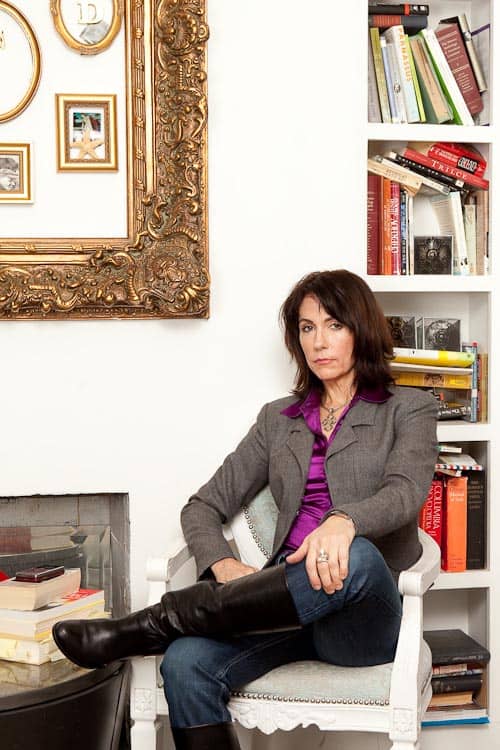A few years ago, before The Jesuit Post was founded, I interviewed memoirist and poet Mary Karr for America Magazine. “To See With God’s Eyes” was published well before the current conversation on the state of Catholic writing began gathering steam. Regular readers know that TJP has joined that conversation, interviewing a variety of Catholic authors since – to date, Dana Gioia, Nick Ripatrizone, Kaya Oakes, and Michael O’Brien.
We wanted Mary Karr’s voice in the fray as well, especially as an author of nonfiction and a poet. I reconnected with her to amplify some of the topics from our original interview. The following is an edited version of my original article, reprinted by kind permission of our friends at America. The section “Scream and Shout?” near the end of the essay has been added in this version. Ms. Karr’s poem, “Descending Theology: The Resurrection” is reprinted below with her permission.
* * *
In any conversation about Ignatian spirituality, the phrase “finding God in all things” crops up quickly. Although those precise words do not appear in the text of St. Ignatius Loyola’s Spiritual Exercises, the idea does; it is a “grace” that Ignatius desired for those making their way through the Exercises. But while it is widely considered a hallmark of the saint’s spiritual legacy, finding God in all things is not a skill most believers are born with. Nor is it an easy task.
Just ask Mary Karr, the bestselling author, poet and practitioner of Ignatian spirituality. “I don’t much care to see God in all things,” Karr has written, calling it an idea that “doesn’t innately appeal to me.” When I first met with her in New York, I asked what she meant. “I want to find God where I want to find him. You know, when it’s convenient, when I’m ready—like maybe Christmas Eve or Easter, where we’ve got it kind of taped off.”
Karr’s own writings show that God is not so easily managed. Her poem “Disgraceland” recounts how she “lurched out to kiss the wrong mouths,/ to get stewed, and sulk around.” Meanwhile, “Christ always stood/ to one side with a glass of water./ I swatted the sap away.” Eventually, Karr stopped getting “stewed” and took a different kind of drink: the water she had long refused. She converted to Catholicism in 1996 and, several years later, “made” the Exercises in daily life (praying with Ignatius’ meditations while continuing her normal tasks, rather than sequestering herself for a monthlong retreat).
I spoke with Karr about finding God in all things not simply because she understands the Exercises but because she is a writer. Recent years have seen a surge of literary interest in what the late Rev. Andrew Greeley has termed the Catholic imagination. Father Greeley’s work followed the book The Analogical Imagination (1981), by the Rev. David Tracy, in which the author outlined two different modes of Christian imagination. The “dialectical” imagination, which he associates with various Protestant thinkers, highlights God’s transcendence or separateness from creation. The “analogical” imagination is yoked to Catholic thinkers and stresses God’s immanence or presence in the created realm—in all things. But how do we recognize it?
Ms. Karr has spent years—and thousands of pages, many unpublished—looking for God in her own story. And a harrowing story it is, marked by experiencing a turbulent early life, surviving a sexual assault, coping with her own alcoholism and mental health issues and raising her son even as her marriage crumbled.
The Kindness of Strangers
“It’s horrifying. I wouldn’t recommend it,” she says of revisiting these memories while writing her three memoirs, The Liar’s Club (1995), Cherry (2001) and Lit (2009). “Still,” she continues, “I do think it’s what God wanted me to do and what I needed to do.” When I ask her where in these painful memories she sees God at work, she pauses.
“So many people just came and got me.” She recalls Walt Mink, a mentor and college professor, who first employed her and later even offered to adopt her into his family so that her tuition bills would be paid. Even after she left school, Mink’s support and care followed her. Others, sometimes complete strangers, also “got” her in diverse places—spiritual and geographical. “My sister and I were stranded in Mexico,” she recalls, with no way back to their family home in Texas. “Then some stewardess and pilots just decide to fly us back because we need to go.” In these acts of kindness, in the fact “that people didn’t sell us into slavery”—she says with a laugh—and “that things actually turned out as well as they did,” she sees the workings of grace.
Still, writing honest memoirs demanded that she relive “devastating” memories. “I had to occupy that mind—that helplessness and dependence of a kid—in order to feel what was actually going on at that time.”
Paradoxically, in these places of great vulnerability, hurt and abandonment, we are closest to God—and vice versa. In such moments, as they are lived and as we relive them in memory, we find God in our stories. “It’s only in heartbreak that we turn to God,” she tells me. Elsewhere, she has written, “People usually (always?) come to church…as to prayer and poetry—through suffering and terror, need and fear—flaming arrows gone thump in the heart.” This idea, which runs through her work, reappears even more starkly in a poem from Sinners Welcome (2006): “Only in tears do I speak/ directly to him and with such/ conviction.”
It was in moments of tears—especially when trying to get sober—that God found her. “Some of my Protestant friends claim to turn out of virtue. I don’t have enough virtue to turn.”
Beware the Stairmaster
Even if interactions with others can reveal God’s presence in one’s life, relationships can be places where God remains elusive. “I’m a peasant by nature, but I’m not a naturally democratic person. I don’t like most people. I’m a little bit of a misanthrope,” Karr deadpans.
“My natural reflex is that I’m being attacked,” she says. No doubt part of this mistrust is instinctual, the result of having been abused as a child. As Exhibit A, she tells a tale that has me suddenly grateful for the table between us: “I was once on the Stairmaster at the gym, and a friend of mine just touched me from behind—nothing untoward—and I broke his nose with my elbow.
What about the difficulty of finding God in other people when our first instinct may be fear or suspicion? “My sense of other people as the enemy is a constant threat to my being able to love them,” she says. The only solutions, she has come to believe, are prayer and acts of love. The grace of prayer, for her, is “restraint of pen and tongue.”
Love is a verb, in other words, not a noun. “If you live in New York City, where it’s 105 degrees, I have to walk out of this apartment wondering where I’m going to be of service.” She tries to be of service, first to her students at Syracuse University, where she holds an endowed chair. Their phone calls are answered on the assumption that it may be “a call from Jesus.” She also ministers to women, especially those who have been abused or who are trying to get sober and raise children. Yet she is quick to note that this is not just a way to overcome the attack instinct but also a ministry to herself, a necessity of self-care.
Scream and Shout?
Above the sink in Ms. Karr’s apartment is a familiar quotation from Dorothy Day: “Don’t call me a saint. I don’t want to be dismissed so easily.” Though Saint Mary Karr’s canonization dossier would prove a lively read—what saint muses about greeting God with “You amateur!” at the Pearly Gates?—we spend more time discussing the specter of easy dismissal. In conveying the search for God in the things of this world, Karr is conscious of walking a careful line—neither devolving into pious pap nor alienating nonreligious readers.
When we first met in 2011, Karr said of her readers: “I want to speak in a way they’ll be able to hear.” Fast-forward to today, and this issue has featured prominently in the contemporary debate about Catholic writing (especially Catholic fiction). What is the best way for a Catholic writer to speak about faith in order to be heard? One response is what Gregory Wolfe has identified as the “still, small voice” of faith, which issues in whispers, not shouts. For his part, Paul Elie has called writing in this mode “fiction in which belief acts obscurely or inconclusively.” He has suggested the continued viability of more direct, even epiphanic, treatment of religious themes, operating “without ‘whispering’ or fretting overmuch about what the culture supposedly won’t allow us to do.”
This question implicates non-fiction writers and poets as well, and it has been a leitmotif in my conversations with Mary Karr. “Great writers of all kinds handle the whole range of human experience, including religious experience,” she says. And, reflecting on a recent spate of books featuring quite overt God-talk – she mentions Christian Wiman’s My Bright Abyss here – “people are clearly interested in faith.” For Karr, the issue of whether and how to write about faith depends on the author and doesn’t lend to easy generalization. On one hand, it is a question of aptitude: “I have to look at what is the nature of my ability; what I can do better than, say, some other people.” But on the other hand, Karr also stresses writing as a vocation: “I pray before I work, and I ask God ‘What am I supposed to be writing about?’ I had a strong sense that I was supposed to write about my conversion [to Catholicism] and my response was ‘Let this cup pass from me!’”
So while she’s willing to talk quite openly about her faith in a voice much louder than a whisper, Karr still thinks it’s her duty to “translate my spiritual experiences” so that they can be heard today, in an age where “doubt is the American religion, and whoever believes the least wins.” This is especially true in light of her belief, mentioned several times, that she is writing primarily (though not exclusively) for a secular audience. Practically, this means that “in talking about my faith, even with people who believe, I lead with my doubt.” In her view, this is not solely a matter of speaking in a way people can hear – it’s a matter of accurately portraying the life of faith: “the truth is that love and grace don’t really read on the page unless you set them next to fear and trembling. I want to write about moments of joy, but it’s hard to show it except in relief to suffering.”
There is a middle path here, one trod between shouts and whispers in speaking about God and faith. It is, Karr suggests, a question of discernment. This is one reason her writing continues to occupy a unique position in the literary world. Though acutely aware of a “certain type of church lady who doesn’t like me,” she tries to speak convincingly of God to believers and nonbelievers alike. Standing astride the polarities of sacredness and secularity, she addresses both the pre- and the unconverted at the same time and in the same voice. Her task, as she sees it, is to write truthfully about the unavoidably religious world she inhabits, without alienating those who “don’t want to hear about Jesus.”
In Sin and Salvation
Karr’s gritty—even coarse—stories of sin and salvation have an undeniable authenticity. She shows us that grace is not always graceful. But if God is to be found in all things, then it is precisely in these all-too-human tales that God is at work.
Returning to America’s headquarters after our initial conversation, I waited for a walk signal in Times Square. It was one of the last places on earth I would choose to seek God. We were a noisy, sweaty, pushy bunch of human beings that afternoon. Yet it is precisely here that believers take up the demand of St. Ignatius to seek God in all things. Or, as Ms. Karr would have it, “to love the world the way God loves the world, or at least be present in it to try and see where God is.”
—//—
Descending Theology: The Garden
We know he was a man because, once doomed,
he begged for reprieve. See him
grieving on his rock under olive trees,
his companions asleep
on the hard ground around him
wrapped in old hides.
Not one stayed awake as he’d asked.
That went through him like a sword.
He wished with all his being to stay
but gave up
bargaining at the sky. He knew
it was all mercy anyhow,
unearned as breath. The Father couldn’t intervene,
though that gaze was never
not rapt, a mantle around him. This
was our doing, our death.
The dark prince had poured the vial of poison
into the betrayer’s ear,
and it was done. Around the oasis where Jesus wept,
the cracked earth radiated out for miles.
In the green center, Jesus prayed for the pardon
of Judas, who was approaching
with soldiers, glancing up—as Christ was—into
the punctured sky till his neck bones
ached. Here is his tear-riven face come
to press a kiss on his brother.



